Understanding Crypto Wallets: A Handbook for Choosing the Perfect One
Introduction
What is a crypto wallet? This question may seem straightforward, but the answer lays the foundation for understanding why selecting the right one is crucial.
A crypto wallet is a digital device, software, or service that encrypts your public and private keys, allowing you to send, receive, and manage your digital assets like cryptocurrencies. It forms an integral part of any blockchain transaction process.
Choosing a suitable crypto wallet is not merely about convenience; it's about security, flexibility, and control over your digital assets. The wrong choice can lead to losses due to hacking attacks or simply inconvenience due to lack of features.
This guide will delve into different types of crypto wallets, outline their pros and cons, highlight important security considerations, and explain what features to look out for.
By the end of this guide, you'll be equipped with the knowledge necessary to make an informed decision when selecting a crypto wallet that aligns with your specific storage, security, and trading needs. Remember, in the world of cryptocurrencies, knowledge equals power. And in this case, it also equals secure digital asset management.
Let's dive in!
Understanding Crypto Wallets
Crypto wallets serve as the backbone for individuals engaging with digital currencies, providing the means to store private and public keys and maintain full custody over assets. These wallets offer a diverse range of options tailored to varying needs, from desktop applications to mobile and web-based platforms.
Hot Wallets
The Essence of Hot Wallets
Hot wallets are connected to the internet, offering a blend of convenience and quick access, which is essential for frequent transactions and users who prioritize ease over an additional layer of security.
A simple analogy for hot wallets is to view them as the cash you carry in your pocket, reserved for immediate expenses, while bulkier sums are safeguarded in a bank.
Strengths and Weaknesses
Hot wallets present unique benefits and compromises:
Strengths
- Convenience and Accessibility: Hot wallets are connected to the internet, which means you have quick access to your assets at any given time and from any device with an internet connection. This is ideal for frequent traders and those who prioritize ease of transactions
- Variety of Platforms: Hot wallets can be tailored to various needs, from desktop applications to mobile and web-based platforms. This provides flexibility in how you manage and access your crypto assets.
- In-built Features: Many hot wallets come with rich features like built-in exchange options and customizable fees, enhancing the overall user experience.
Weaknesses
- Vulnerability to Online Threats: Being connected to the internet makes hot wallets susceptible to online threats such as hacking and phishing attacks.
- Less Control: While hot wallets offer convenience, they also mean that you're entrusting your private keys to a third party. This could potentially compromise the control you have over your assets.
- Dependence on Internet Connection: The usability of hot wallets is highly dependent on a stable internet connection. Any disruptions can prevent access to your funds, which could be problematic if you need to make urgent transactions.
Types of Hot Wallets
1. Desktop Wallets: These wallets are installed on a personal computer, offering full control and security since they reside on your own hardware. An example includes Exodus, known for its sleek design and intuitive interface.
The most well-known desktop wallets in the marketplace include:
- Electrum – A preeminent open-source wallet, dedicated solely to Bitcoin transactions.
- Exodus – Known for its modern aesthetics and easy-to-navigate interface, this user-friendly multicurrency desktop wallet is highly acclaimed.
- Wasabi – This privacy-centric Bitcoin wallet is renowned for its robust security measures and the implementation of CoinJoin, which assists users in making their transactions anonymous.
2. Mobile Wallets: Mobile wallets are app-based wallets that can be installed on your smartphone. They offer the convenience of transacting anywhere at any time, right from the palm of your hand.
The most recognized mobile wallets on the market are:
- BlueWallet – A Leading mobile wallet for Bitcoin that is open-source.
- Exodus (Mobile Version) – Extends its desktop convenience to mobile with a similar user experience.
- Samourai – Provides sophisticated privacy measures for Bitcoin transactions on Android systems.
3. Web Wallets: Web wallets are accessed through internet browsers and offer quick access to your assets from any device connected to the internet. However, they are considered less secure due to potential vulnerability to online threats.
The most recognized web wallets on the market are:
- Blockchain.com – Offers a straightforward user interface suitable for beginners.
- Metamask.io – Integrates seamlessly with numerous decentralized applications (dApps) on the Ethereum network.
- Exchange Wallets – Essentially, all trading platforms function as hot wallets.
Each type of hot wallet offers unique benefits geared towards specific usage scenarios—be it trading agility or routine transactions—while acknowledging the inherent risks associated with their connectivity. Users must weigh these factors against their individual needs for convenience against potential security vulnerabilities.
Cold Wallets
In the vast universe of crypto wallets, cold wallets stand out for their enhanced security. The term ‘cold' refers to the wallet's offline status, distancing it from internet-related threats. In essence, they are designed to provide full custody over assets by safely storing private/public keys in an offline environment.
Strengths and Weaknesses
Cold wallets offer distinct advantages and trade-offs:
Strengths
- Security: Cold wallets are immune to online attacks as they operate offline. They are ideal for storing large amounts of cryptocurrency since they eliminate the risk of hacking.
- Ownership: Since cold wallets give users complete control over their private keys, they ensure that third parties cannot access your cryptocurrencies without your consent.
Weaknesses
- Accessibility: While cold wallets provide superior security, they may not be as easy to use as their hot counterparts. Hardware wallets require connection to a computer to conduct transactions which can be inconvenient for frequent traders.
- Risk of loss: Physical damage or misplacement can lead to loss of access to your cryptocurrencies. It is crucial to keep hardware, paper, or steel wallets in safe places.
Types of Cold Wallets
Diving deeper into this category, we come across different types:
1. Hardware Wallets: These devices look like USB drives and store private keys offline. The Trezor Model T and Ledger Nano X are prime examples. Users can make transactions online by connecting these devices to a computer while the keys remain secure within the device.
The most recognized hardware wallets on the market
- ColdCard – A Device Exclusively for Bitcoin Transaction Signing.
- Trezor Model T – The world's first and fully open-source model.
- Ledger Nano X – Commonly used, supports a wide range of cryptocurrencies.
- KeepKey – Secure hardware wallet that provides comprehensive protection.
2. Paper Wallets: A paper wallet involves printing or writing down public/private keys on paper. It's a simple yet effective way to keep keys secure from digital threats.
The paper wallets that are most widely used at present include:
- Shieldfolio – A durable and waterproof paper wallet that comes with tamper-evident seals.
- BitAddress – This is a well-known open-source paper wallet generator that gives users the ability to craft their own wallets while offline.
- DIY Approach – The option to build your own paper wallet is available.
3. Steel Wallets: Taking the concept of paper wallets a step further, steel wallets involve engraving or etching private keys onto corrosion-resistant steel plates. They offer resilience against physical damage such as fire or water.
- Some reputable steel wallet options include:
- Cryptosteel – Compact and highly durable, this device guarantees long-term preservation of private keys.
- Billfodl – An exceptionally resilient steel wallet that is both robust and fireproof.
- CypherSafe – Water and fire resistant, offering a high level of protection for your private keys.
The choice between hot and cold wallets depends on your needs. If security is a priority and you do not need to access your cryptocurrencies frequently, cold wallets like Billfodl or Trezor Model T could be your best bet. Conversely, if ease of use and accessibility rank higher on your list, hot wallets might serve you better.
Security Considerations for Crypto Wallets
When it comes to cryptocurrencies, understanding security is crucial. Hackers often target digital assets, so protecting your crypto wallet should be a priority.
Vulnerability To Hacking
Cryptocurrencies are popular targets for cyber criminals because they are digital. Digital wallets, especially those connected to the internet (hot wallets), can be vulnerable to different cyber attacks like phishing scams, malware infections, and brute force attacks that try to guess your passwords or seed phrases.
Even if you think your cold wallet is safe, think again. While cold wallets are more secure than hot wallets, they are not impossible to breach. If someone steals your hardware wallet and gets hold of your seed phrase, they can still access it. Also, if you buy hardware wallets from unofficial stores, they might have been tampered with, putting you at risk.
Security Features: Hot Vs Cold Wallets
Hot and cold wallets offer different levels of security:
- Hot Wallets: These wallets prioritize convenience over security. Your private keys are stored online, which makes them susceptible to hacking attempts. However, many hot wallets have additional security measures like two-factor authentication (2FA), multi-signature transactions, and password encryption to reduce these risks.
- Cold Wallets: Cold wallets are known for their strong security features. They keep your private keys offline and protected from online threats. Some models even have extra layers of physical security such as PIN codes or biometric authentication methods.
Despite the varying levels of protection offered by hot and cold wallets, one type stands out: hardware wallets.
Crafting Your Own Personal Cold Wallet
It's crucial to highlight that you have the option to establish your personal cold wallet using wallets such as Electrum. This can be achieved by purchasing a new computer, installing Electrum on it, and deliberately avoiding any internet connection. Leading wallets like Electrum offer offline transaction signing capabilities. When paired with hardware wallet and multisig features, these types of wallets potentially provide the highest level of security possible.
Why Choose Hardware Wallets?
Hardware wallets combine accessibility with security. They store your private keys offline on a physical device, making them inaccessible to online attacks. They only connect to the internet when you want to make a transaction, minimizing the time when they could be compromised.
These wallets use advanced security protocols, including PIN codes and recovery phrases. Some even have passphrase features, where you add an extra word to your recovery phrase for added protection. If your wallet is stolen or lost, this passphrase acts as a backup, preventing unauthorized access to your funds.
Securing your digital assets is a serious responsibility. As we learn more about crypto wallets, remember that protecting your investments is just as important as making wise investment choices.
Choosing the Right Crypto Wallet
Selecting a crypto wallet isn't just a matter of preference—it's about safeguarding your digital assets with the utmost diligence. Below is a strategic guide to navigating the crucial factors in making an informed choice.
Credibility and Reputation
Trust isn't given; it's earned. This axiom holds true in the realm of crypto wallets. A wallet with unshakeable credibility brings peace of mind, knowing that your investments are in secure hands. Researching a wallet's track record can illuminate its reliability and commitment to user security.
Tips for Assessing Credibility:
- Look for longevity: Established wallets have weathered the storm of market fluctuations and security threats.
- Community trust: Engage with community forums and social media to gauge user experiences.
- History of breaches: Investigate any past security issues and how they were resolved.
Coin Support
Diversity in asset support is not just a luxury; it's essential. Whether you're a veteran trader diversifying your portfolio or a newcomer eager to explore beyond Bitcoin, coin support matters.
Considerations for Coin Support:
- Multicurrency wallets: These provide flexibility and the ability to manage multiple types of cryptocurrencies under one roof.
- Future-proofing: As the crypto landscape evolves, so should your wallet’s ability to adapt and include emerging coins.
User Experience and Ease of Use
Simplicity in design equates to efficiency in action. The ideal wallet combines aesthetic appeal with intuitive functionality, allowing seamless navigation even for those new to the crypto space.
Features to Look for in User Experience:
- Intuitive interfaces: Reduce learning curves and enhance transaction efficiency.
- Cross-platform availability: Access your funds whether on desktop, web, or mobile.
- Customer support: Ensure help is at hand when you need it—via email, live chat, or comprehensive FAQs.
Security Features
The fortress of your digital assets must be impregnable. Prioritize wallets that offer robust security features:
Essential Security Measures:
- Private key storage: Your keys should remain solely under your control, preferably stored offline.
- Two-factor authentication (2FA): An additional layer of security that requires two forms of identification before access is granted.
- Community audits for open-source wallets: Transparency in code allows for community verification, ensuring no hidden vulnerabilities lurk within.
A Detailed Examination of Popular Crypto Wallets
Each wallet is uniquely crafted to address different needs. We will now explore some of the best options available for each type: Desktop, Mobile, Web, and Hardware wallets.
ColdCard: A Dedicated Bitcoin Transaction Signing Device
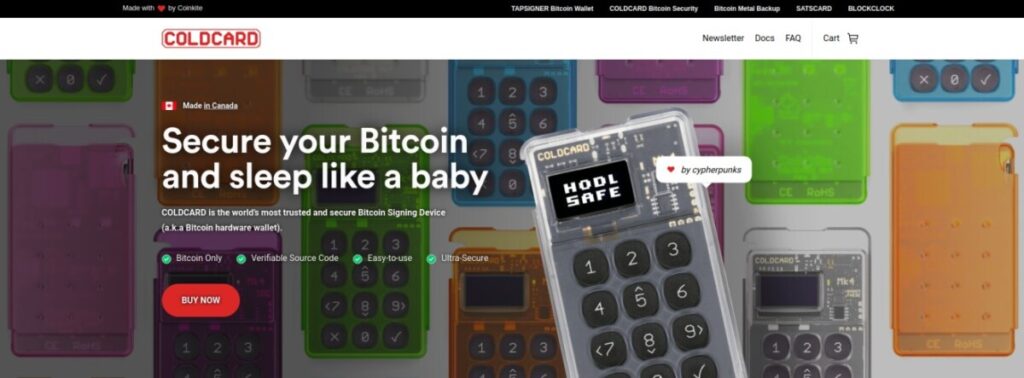
ColdCard: A High-Security Hardware Wallet for Bitcoin Transactions
The ColdCard wallet is a highly secure, Bitcoin-specific hardware wallet, designed with the objective of providing maximum protection to your digital assets. It is a favored choice among Bitcoin cypherpunks who prioritize security and simplicity in their transactions.
Profound Security Measures
ColdCard's security features are what set it apart. It adopts air-gapped signing, a feature that ensures your private keys never interact with an internet-connected device. This means that the risk of your keys being intercepted or stolen online is essentially zero.
Air-gapped Signing: An advanced security measure where the device that signs the transaction (in this case, the ColdCard wallet) is never connected to the internet. This provides an additional layer of protection against online threats.
Moreover, the device employs multiple authentication methods, including a PIN code and a microSD card. This dual-factor authentication makes it virtually impenetrable to hackers.
- PIN Code: An essential security component you set up during initialization to access your ColdCard wallet.
- MicroSD Card: Used for firmware updates and wallet backups, providing an additional authentication layer.
Simplicity at its Core
Despite its stringent security measures, ColdCard doesn't compromise on user experience. Its interface is designed for simplicity and ease of use, with clear instructions for every step of setting up and using the device. This makes it an excellent choice even for beginners in the cryptocurrency space.
A Bitcoin-Specific Solution
Unlike many other wallets that support multiple cryptocurrencies, ColdCard focuses solely on Bitcoin. This specific focus allows it to provide an optimized experience for Bitcoin users, ensuring all features are tailored specifically towards managing and transacting with Bitcoin.
In conclusion, if you’re a Bitcoin enthusiast seeking top-notch security coupled with simplicity for your digital assets management, ColdCard stands as one of the best options available today.
Trezor Model T: Leading Open-Source Hardware Wallet
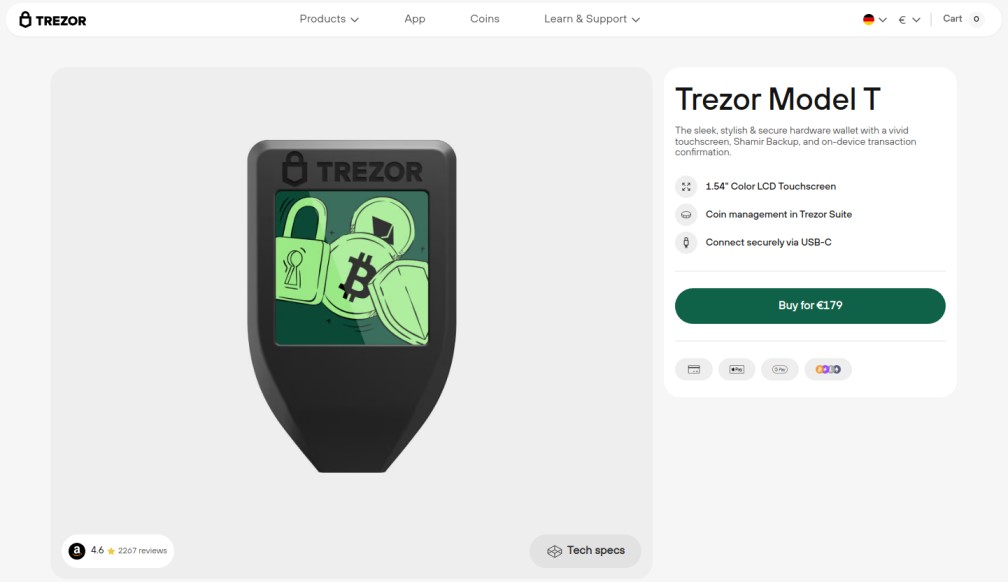
The Trezor Model T is a top-tier open-source hardware wallet, celebrated for its exceptional security, long history and comprehensive support for a myriad of cryptocurrencies. As a hardware wallet, it offers offline storage, ensuring your assets remain safe from online threats.
Elegant Design and User-Friendly Interface
The Trezor Model T comes with an aesthetically pleasing design that doesn't compromise on functionality. The large color touchscreen enhances navigation, facilitating seamless transaction confirmation. It's designed to simplify complex crypto operations, making it accessible even to beginners in the crypto space.
Broad Cryptocurrency Support
One of the standout features of the Trezor Model T is its extensive compatibility with various cryptocurrencies and platforms. It supports:
- Bitcoin, Ethereum, Monero
- And over 8000+ other coins & tokens.
The Trezor Model T is capable of synchronizing with various third party apps like Electrum, Exodus and web wallets like MetaMask, thereby enriching both the Bitcoin, and the Ethereum DeFi ecosystem. This versatility allows users to manage their digital assets portfolio with ease and dexterity.
Robust Security Measures
The Trezor Model T goes beyond the standard security measures found in many wallets. Here are some of its notable security features:
- PIN Entry: The device requires a PIN for access, adding an extra layer of security.
- Passphrase Encryption: You can create a unique passphrase which acts as an additional hidden wallet and seed word to your recovery seed phrase.
- Physical Verification: All transactions must be physically verified on the device itself, preventing remote hacking attempts.
In conclusion, the Trezor Model T is more than just a hardware wallet. It's a comprehensive solution for secure cryptocurrency management, offering versatility and ease of use along with robust security measures. This makes it an excellent choice for both new entrants and seasoned veterans in the world of cryptocurrency.
Ledger Nano X – A Comprehensive Review (Hardware Wallet)
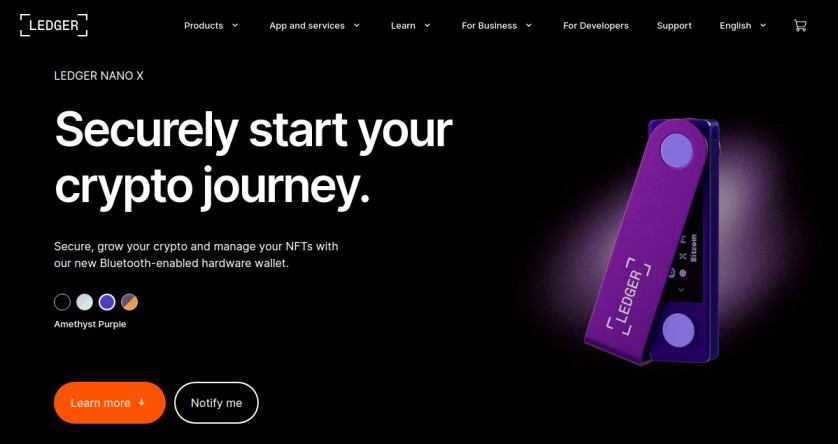
The Ledger Nano X is a high-quality hardware wallet that provides top-notch security and convenience for cryptocurrency users. This compact, yet powerful device packs an array of features designed to securely manage your digital assets while offering decent user experience.
Seamless Integration with Mobile Devices
One of the standout features of the Ledger Nano X is its Bluetooth connectivity. This functionality allows you to effortlessly pair the wallet with your mobile device, enabling quick and secure access to your funds wherever you are. This feature gives you freedom and flexibility in managing your cryptocurrencies on-the-go.
Extensive Storage Capacity
The Ledger Nano X stands out in the market due to its impressive storage capacity. It can accommodate up to 100 different cryptocurrency apps simultaneously. This vast storage space allows users to manage a diverse portfolio of digital assets all in one place, reducing the need for multiple wallets and streamlining your crypto management process.
Broad Cryptocurrency Support
In line with providing flexibility, the Ledger Nano X supports a wide range of cryptocurrencies. From popular coins like Bitcoin, Ethereum, and Litecoin to over 5000 other types of coins and tokens. This broad compatibility makes it an excellent choice for both beginners exploring different coins and seasoned traders diversifying their investment portfolio.
Uncompromising Security Measures
The Ledger Nano X incorporates robust security measures with standard practices:
- PIN Entry: The device requires a PIN for access, providing an extra layer of security.
- Physical Verification: To safeguard against remote hacking attempts, all transactions must be physically verified on the device itself.
In essence, the Ledger Nano X delivers more than just a hardware wallet. It offers an integrated solution for secure cryptocurrency management that combines versatility, ease of use and robust security measures. It's an excellent choice for anyone involved in the world of cryptocurrency.
Electrum: A Bitcoin-Specific Desktop Wallet with Exceptional Security Features
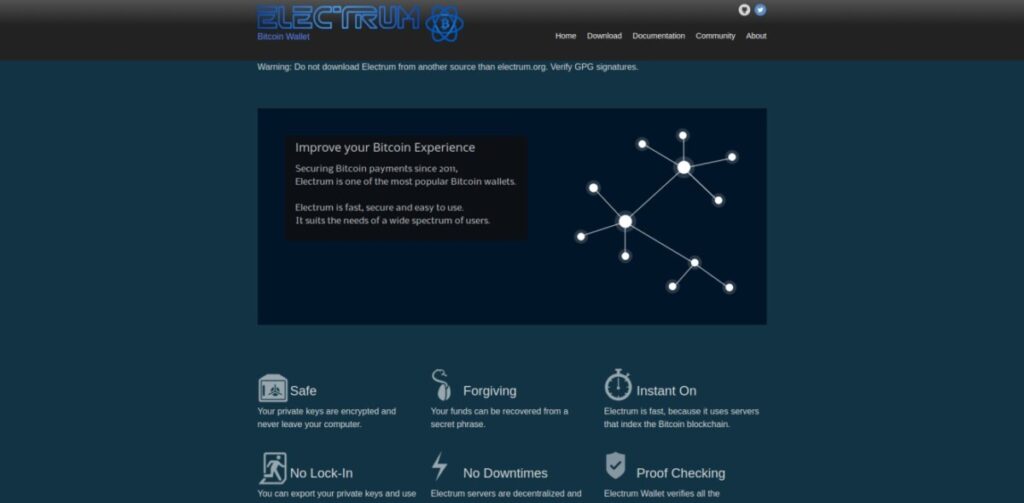
If your crypto interests are primarily centered around Bitcoin, then Electrum should be on your radar. While it might not offer the extensive compatibility of wallets like Exodus, Electrum more than makes up for it with its array of security measures specifically tailored to Bitcoin users.
Key Features of Electrum
- Connection to Your Own Bitcoin Full Node: One standout feature of Electrum is its capacity to connect directly to your personal Bitcoin full node. This capability eliminates the need for third-party servers to authenticate your transactions, thus bolstering your privacy and minimizing vulnerability to potential attacks.
Interesting fact: A full node is a program that fully validates transactions and blocks in a blockchain network. By running one, you're contributing to the decentralization and overall health of the network.
- Cold Storage Option: With Electrum, you have the option for cold storage – a method where your private keys (your digital signature for authorizing transactions) are securely stored offline. This further strengthens security by protecting against online hacking attempts.
- Multi-signature Support: Another distinguishing feature of Electrum is its support for multi-signature wallets. These types of wallets necessitate multiple signatures to authorize a single transaction, adding an extra layer of security that can be especially advantageous for businesses or individuals dealing with significant amounts of Bitcoin.
While Electrum's focus is firmly on Bitcoin, its strong security measures have earned it high praise and trust within the cryptocurrency community. It's an excellent choice for those seeking a highly secure and reliable wallet specifically designed for managing Bitcoin storage and transactions.
Exodus: A Compatible Wallet for Both Desktop and Mobile Platforms

For those seeking a versatile and user-friendly option for both desktop and mobile, Exodus is a reliable choice. This digital wallet has gained popularity due to its ease of use, impressive feature set, and high level of security.
User Experience
Exodus offers a clean and intuitive interface that's designed with simplicity in mind. It's easy to navigate, making it an optimal choice for beginners in the world of cryptocurrency. The desktop application provides a comprehensive overview of your portfolio, while the mobile version allows for quick access and transaction capability on the go.
Broad Cryptocurrency Support
Exodus supports a wide range of cryptocurrencies, currently over 100+ different coins. This includes popular options such as:
Bitcoin (BTC), Ethereum (ETH), Ripple (XRP), Litecoin (LTC), Monero (XMR), And many more…
This broad support empowers you with flexibility when managing your portfolio.
Security Measures
Despite its user-friendly interface, Exodus does not compromise on security. The wallet incorporates several robust security features:
- Private Keys: Exodus encrypts your private keys and transaction data on your physical device so that no one can access your cryptocurrency but you.
- Backup System: The wallet provides a simple backup system that allows you to restore your seed phrase should you lose access to your device.
- Two-Factor Authentication (2FA): For added security, Exodus supports 2FA, providing an extra layer of protection.
Overall, Exodus is a well-rounded digital wallet that combines convenience with extensive functionality and security.
MetaMask: An Ethereum-Based Web Wallet
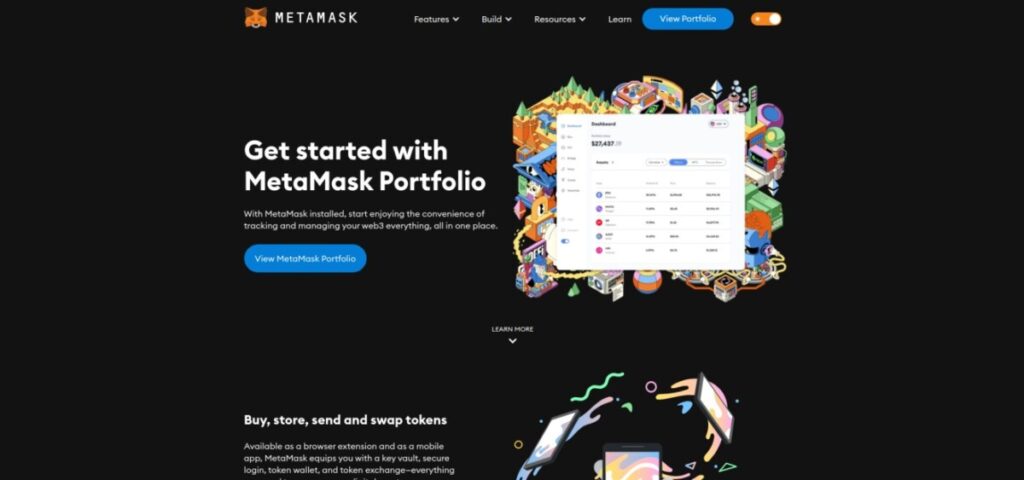
When it comes to interacting with the Ethereum blockchain, one of the most popular options is MetaMask. It's a unique tool that functions as both a cryptocurrency wallet and a gateway to Ethereum-based decentralized applications (dApps).
One way to think of MetaMask is to see it as an interface, with a hardware wallet like Trezor Model T serving as the secure key to access this interface.
Key Features:
1. Web3 Compatibility
- MetaMask provides a seamless connection between your browser and the Ethereum network. Thanks to its Web3 compatibility, you can directly interact with dApps from your browser, without running a full Ethereum node.
2. User-Friendly Interface
- For those new to the crypto space, MetaMask's interface is intuitively designed for easy navigation. It simplifies complex operations such as sending transactions, token swapping and connecting to dApps into straightforward processes.
3. ERC-20 and ERC-721 Support
- With MetaMask, managing your digital assets is convenient. It supports not only Ethereum but also ERC-20 tokens (fungible tokens like stablecoins) and ERC-721 tokens (non-fungible tokens or NFTs).
4. Built-in Token Swapping
- For added convenience, MetaMask features built-in token swapping functionality. This means you can swap between different Ethereum tokens right within your wallet interface, eliminating the need for external platforms.
Fun Fact: Did you know that MetaMask was developed by ConsenSys, a leading blockchain technology company?
In conclusion, whether for storing your Ether safely, interacting with various dApps or trading tokens, MetaMask provides an all-encompassing solution that combines usability with robust security measures.
Conclusion
Selecting the right cryptocurrency wallet is crucial for ensuring the safety of your digital assets. By considering factors such as user experience, security features, and compatibility with your preferred platforms, you can find a wallet that aligns with your needs. Whether you opt for a hardware wallet like the Trezor Model T or a mobile wallet like Exodus, prioritizing security and usability is key to navigating the crypto space with confidence.
Ensuring Wallet Security
The backbone of cryptocurrency security is the seed phrase, a series of words that grants access to your funds. Losing a seed phrase can be catastrophic, akin to losing a key to an impenetrable safe. To circumvent such a disaster, follow these steps:
1. Encrypt and backup your seed phrase in multiple secure locations.
Think safety deposit boxes, fireproof safes, or any place where you might store valuables with the utmost discretion.
2. Consider using metal seed storage solutions for added resilience against physical damage.
These plates or cards are made of durable materials like stainless steel and can withstand extreme conditions, ensuring your seed phrase remains intact even in the face of fire, water, or other disasters.
3. Avoid storing your seed phrase digitally, as this exposes it to potential hacking or theft.
Even if you use strong encryption methods, there's always a risk of digital vulnerabilities. It's best to rely on physical backups for ultimate security.
By following these precautions, you can safeguard your digital assets and have peace of mind knowing that your funds are protected against various threats.
Fake wallets and unofficial hardware shops are traps for the unwary.
Here's how you sidestep these pitfalls:
Download wallets from official sources only.
Before downloading, verify the URL – watch out for subtle misspellings designed to deceive.
Purchase hardware wallets directly from the manufacturer or authorized retailers.
This minimizes the risk of receiving tampered devices.
Remember, falling into the trap of fake wallets or hardware shops doesn't just mean potential financial loss; it also means your entire digital identity is at stake. So apply due diligence and always question the authenticity of sources.
As we navigate through the intricacies of wallet security, let's not forget that security isn't just about what you do, but also about what you avoid doing:
- Refrain from sharing your private keys or seed phrases with anyone.
- Treat them as you would a password to your most private information – because in essence, that's what they are.
Moving forward, understand that wallet security extends beyond protecting from external threats – it encompasses internal vigilance and a robust operational protocol that ensures your digital wealth remains under lock and key.
Note: The advice provided here should be supplemented with personal research and tailored to individual circumstances.
Features and Services to Look for in Crypto Wallets
When determining the ideal crypto wallet, several features stand out as non-negotiable for savvy users. These elements ensure not just the safekeeping of digital assets but also contribute to a seamless and efficient crypto experience.
1. Reliable Transaction Capabilities
Users must be able to trust their wallet's ability to send and receive cryptocurrencies promptly and without error. This reliability is fundamental because it forms the core functionality of any crypto wallet. For instance, Trezor is recognized for its robust multi-chain support, facilitating transactions across various networks with ease.
2. Built-in Exchange Options
The convenience of converting one cryptocurrency to another within your wallet cannot be overstated. A built-in exchange offers seamless trading, saving time and reducing the risk associated with transferring funds between different services. Wallets like Exodus have gained popularity by integrating this feature, providing a straightforward interface for on-the-fly asset exchange.
3. Customizable Fees
In an ecosystem where transaction costs can fluctuate wildly, having the ability to set custom fees is an invaluable tool for users. This feature not only allows individuals to prioritize their transactions during times of network congestion but also helps in managing costs effectively. Wallets that offer customizable fees empower users with the flexibility to navigate the dynamic fee landscape of blockchain networks.
Each of these features contributes significantly to a user's control over their digital assets. By offering robust storage solutions tailored to transactional efficiency and financial prudence through customizable fees, wallets position themselves as indispensable tools in the hands of cryptocurrency enthusiasts.
Choosing a wallet equipped with these capabilities guarantees a level of empowerment necessary for navigating the ever-evolving crypto space. Whether you're trading daily or holding long-term, these features are pillars that uphold not just asset security but also operational dexterity in your cryptocurrency journey.
Conclusion
Dive into the realm of crypto wallets with a clear objective: to secure your digital assets while accommodating your lifestyle. Whether you're an active trader or a long-term holder, the right wallet exists for your unique storage, security, and trading needs. Let's not forget, the decision isn't to be made hastily.
Remember these key points when selecting a crypto wallet:
- Security: Is it impenetrable enough to withstand the cunning schemes of cyber adversaries?
- Storage: Does it provide the convenience and accessibility you require?
- Trading: Are you looking to execute swift transactions or is this a vault for your digital treasure?
Assess the options available—from hot wallets that offer seamless transactions to cold wallets that stand as bastions of security—and weigh them against your personal criteria. The market presents a plethora of choices; Trezor Model T, Exodus, or Electrum? Each harbors its own strengths.
Consider this guide as a starting point. Venture beyond and scrutinize user reviews, delve into community forums, and evaluate the track record of each wallet. The diligence you apply today fortifies your digital wealth for tomorrow.
As we pave the way in this rapidly evolving digital landscape, your understanding and mastery of crypto wallets will be a catalyst in your journey towards financial sovereignty. The task of selecting the right wallet may seem daunting initially, but remember, it is an investment in your future. Armed with knowledge and driven by due diligence, you can navigate the myriad of options with confidence to identify the ideal crypto wallet that aligns with your needs and safeguards your digital wealth.
FAQs(Frequently Asked Questions)
What is a crypto wallet?
A crypto wallet is a digital tool that allows individuals to securely store, send, and receive their cryptocurrencies. It consists of a public address for receiving funds and a private key for authorizing outgoing transactions.
What are hot wallets?
Hot wallets are cryptocurrency wallets that are connected to the internet. They are convenient for frequent trading and transactions but are more vulnerable to hacking compared to cold wallets.
What are the strengths and weaknesses of hot wallets?
Hot wallets offer the benefit of easy accessibility and quick transactions. However, they are more susceptible to security breaches and hacks due to their online connectivity.
What are cold wallets?
Cold wallets are cryptocurrency wallets that are not connected to the internet, providing an extra layer of security. They are ideal for long-term storage of cryptocurrencies.
What are the strengths and weaknesses of cold wallets?
Cold wallets provide enhanced security as they are offline, making them less vulnerable to hacking. However, they may be less convenient for frequent transactions and trading.
Why choose hardware wallets?
Hardware wallets offer a combination of accessibility and security, as they store the user's private keys offline in a physical device. This makes them highly secure against online threats such as hacking or phishing attempts.



